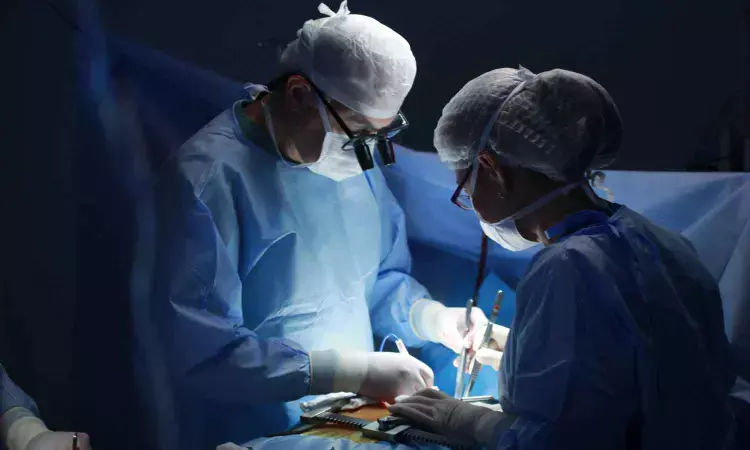- Home
- Medical news & Guidelines
- Anesthesiology
- Cardiology and CTVS
- Critical Care
- Dentistry
- Dermatology
- Diabetes and Endocrinology
- ENT
- Gastroenterology
- Medicine
- Nephrology
- Neurology
- Obstretics-Gynaecology
- Oncology
- Ophthalmology
- Orthopaedics
- Pediatrics-Neonatology
- Psychiatry
- Pulmonology
- Radiology
- Surgery
- Urology
- Laboratory Medicine
- Diet
- Nursing
- Paramedical
- Physiotherapy
- Health news
- Fact Check
- Bone Health Fact Check
- Brain Health Fact Check
- Cancer Related Fact Check
- Child Care Fact Check
- Dental and oral health fact check
- Diabetes and metabolic health fact check
- Diet and Nutrition Fact Check
- Eye and ENT Care Fact Check
- Fitness fact check
- Gut health fact check
- Heart health fact check
- Kidney health fact check
- Medical education fact check
- Men's health fact check
- Respiratory fact check
- Skin and hair care fact check
- Vaccine and Immunization fact check
- Women's health fact check
- AYUSH
- State News
- Andaman and Nicobar Islands
- Andhra Pradesh
- Arunachal Pradesh
- Assam
- Bihar
- Chandigarh
- Chattisgarh
- Dadra and Nagar Haveli
- Daman and Diu
- Delhi
- Goa
- Gujarat
- Haryana
- Himachal Pradesh
- Jammu & Kashmir
- Jharkhand
- Karnataka
- Kerala
- Ladakh
- Lakshadweep
- Madhya Pradesh
- Maharashtra
- Manipur
- Meghalaya
- Mizoram
- Nagaland
- Odisha
- Puducherry
- Punjab
- Rajasthan
- Sikkim
- Tamil Nadu
- Telangana
- Tripura
- Uttar Pradesh
- Uttrakhand
- West Bengal
- Medical Education
- Industry
CAD/CAM shows clinical benefits in jaw reconstruction, reports research

For patients undergoing jaw reconstruction after surgery for head and neck cancer, computer-aided design and manufacturing (CAD/CAM) techniques can improve some key clinical outcomes, reports a study in the May issue of Plastic and Reconstructive Surgery®, the official medical journal of the American Society of Plastic Surgeons (ASPS). The journal is published in the Lippincott portfolio by Wolters Kluwer.
"Our experience suggests that CAD/CAM techniques offer several benefits in patients undergoing free fibula reconstruction of the lower jaw, including a reduced risk of long-term complications requiring hardware removal," comments ASPS Member Surgeon Mario G. Solari, MD, of University of Pittsburgh.
CAD/CAM has 'revolutionized' jaw reconstruction – does it improve patient outcomes?
Over the past decade, "[P]reoperative virtual surgical planning through CAD/CAM has revolutionized the way we approach head and neck reconstruction," according to the authors. Using CAD/CAM technology, surgeons can design and create "three-dimensionally printed, patient-specific cutting guides" as well as pre-formed hardware for use in reconstruction.
CAD/CAM has been successfully applied to "free fibula flap" reconstruction after surgery for head and neck cancer – using bone and tissue grafts from the lower leg to reconstruct the jaw. "However, given the relatively recent introduction [of CAD/CAM], studies performing head-to-head comparison to the conventional technique are limited," Dr. Solari and coauthors write. Their new study directly compares the short- and long-term outcomes of conventional and CAD/CAM-assisted free fibula flap reconstruction.
The study included 215 patients undergoing free fibula reconstruction of the lower jaw (mandible) between 2012 and 2021, mainly after cancer surgery. Of these, 136 patients had CAD/CAM-assisted reconstruction and 79 underwent conventional reconstruction.
Improved efficiency and accuracy with CAD/CAM lead to clinical benefits
Patients undergoing CAD/CAM-assisted reconstruction spent less time in the operating room (OR) – about an hour less than the conventional group. There was no significant difference in hospital days.
Most short-term complications were similar between groups, including return to the OR, major bleeding, blood clot-related complications, and rates of total and complete loss of the free fibula flap were similar as well. However, the CAD/CAM group was less likely to have dehiscence (reopening) of the incision site: 7.4% versus 16.5%.
Analysis of longer-term outcomes (two to 2.5 years) focused on 195 patients with no major complications in the first 30 days. While most long-term complications were similar between groups, patients undergoing CAD/CAM-assisted reconstruction were less likely to need further surgery to remove the reconstruction hardware. After adjustment for potential risk factors, patients in the CAD/CAM group were 60% less likely to undergo hardware removal.
The reduction in operating room time reflects "the lack of time-consuming hardware manipulations and bony adjustments" with conventional free fibula flap reconstruction, the researchers write. Previous studies have reported increased accuracy and solid bone fusion with CAD/CAM; these improvements may lead to a reduction in long-term complications necessitating hardware removal.
The study adds new evidence that integrating CAD/CAM techniques provides meaningful clinical benefits for patients undergoing jaw reconstruction. Dr. Solari and colleagues conclude: "Given the added cost with the use of CAD/CAM, future studies focusing on cost-effectiveness of this approach with respect to long-term outcomes and hardware maintenance will be important to justify the clinical significance of our results."
Reference:
Bengur, Fuat Baris MD1; Humar, Pooja MD1; Saadoun, Rakan MD1,2,3; Khan, Nayel MD1; Anstadt, Erin MD1; Dang, Sophia MD4; Fadia, Neil BS1; Moroni, Elizabeth A. MD, MHA1; Bottegal, Matthew T. BS1; Acarturk, Tahsin Oguz MD1; Sridharan, Shaum MD1,4; Kubik, Mark MD1,4; Solari, Mario G. MD1,4. Computer-Aided Design and Manufacturing in Free Fibula Reconstruction of the Mandible: Comparison of Long-Term Outcomes. Plastic and Reconstructive Surgery 155(5):p 910e-920e, May 2025. | DOI: 10.1097/PRS.0000000000011701
Dr Kamal Kant Kohli-MBBS, DTCD- a chest specialist with more than 30 years of practice and a flair for writing clinical articles, Dr Kamal Kant Kohli joined Medical Dialogues as a Chief Editor of Medical News. Besides writing articles, as an editor, he proofreads and verifies all the medical content published on Medical Dialogues including those coming from journals, studies,medical conferences,guidelines etc. Email: drkohli@medicaldialogues.in. Contact no. 011-43720751


